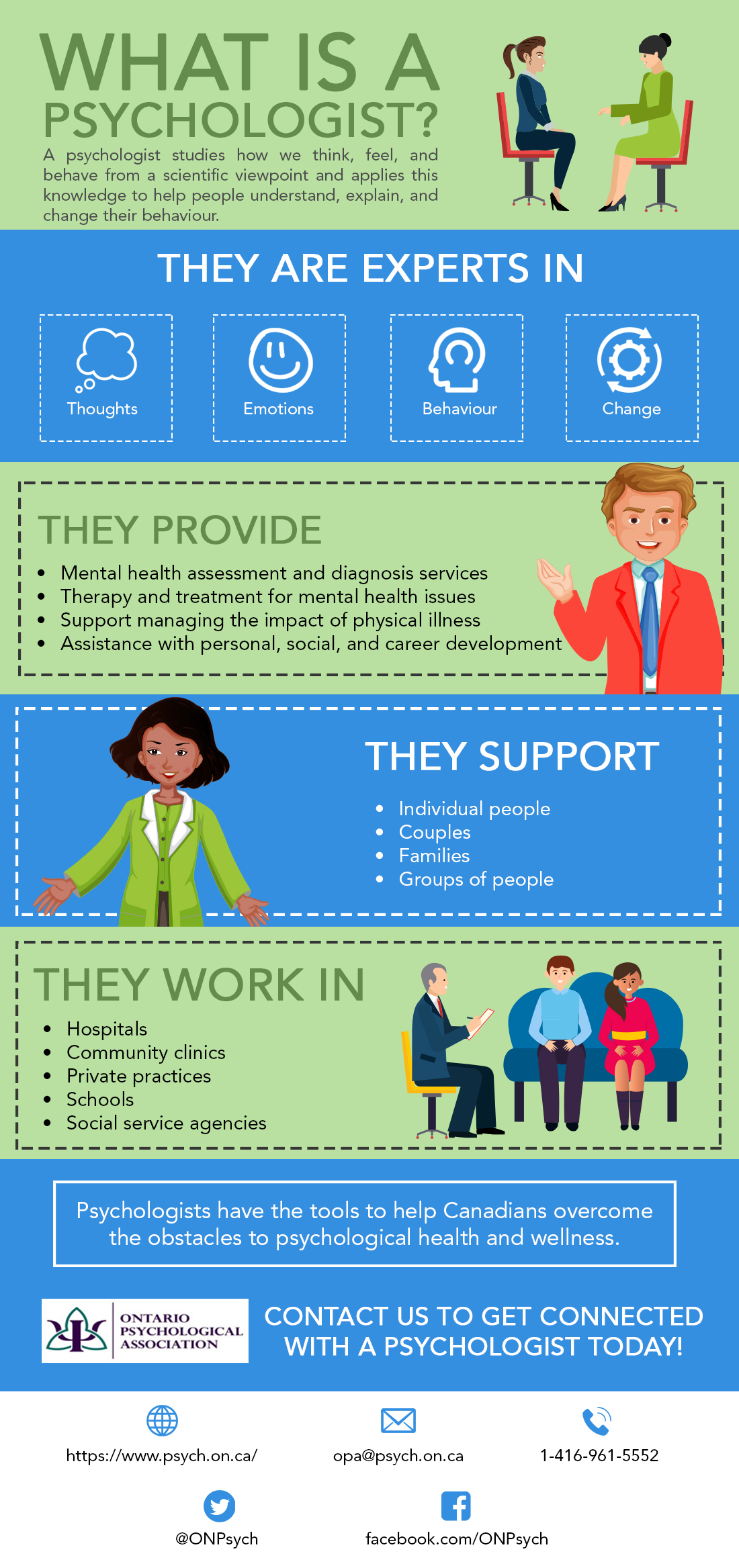What to expect when seeing a Psychological Professional
What happens on my first visit to a psychologist?
During your first appointment(s), your psychologist will typically ask you why you have come. You will be asked to describe your problem in as much detail as possible. The psychologist's questions will likely include:
- When did the problem start?
- Under what circumstances does it occur?
- How long does it last?
- Has it occurred before?
- What makes it worse or better?
The psychologist may also ask how the problem has affected your life in terms of personal distress, interpersonal and family relationships, employment, finances, recreation, and so on, in other words, the activities of daily living.
As background in exploring your current ("presenting") problem, the psychologist may also take a detailed personal and family history. Similarly, the psychologist may also ask about your medical history, medication use, and use of alcohol or street drugs. By gathering all this information, the psychologist can comprehensively evaluate the problem and understand how it affects your well-being. This phase of gathering information can take one or more sessions; it may be supplemented by the use of psychological tests.
Psychological tests are extremely well researched tools. They help the psychologist to understand more about you by comparing your performance on the test with the performance of others. The tests assess a number of skills and behaviours (e.g. thinking (cognitions), emotions, relationships, achievement, neurological functioning). Often other professionals (e.g.family physicians, psychiatrists, teachers) and services (e.g. workers rehabilitation programs) refer patients to psychologists for evaluation through psychological tests.
Finally, the psychologist will work with you to determine how he or she can help you manage or overcome your problem and its impact on your life. Then, you will carry out this plan together to ensure your success.
What is involved in a psychological assessment?
Depending on the problem, a psychological assessment usually begins with an initial intake interview, but may go beyond to include psychological tests or questionnaires, available file review, collaboration or consultation with other care providers, etc. If you, your child, or others in your family are to be assessed, the psychologist will tell you how much time this particular assessment is likely to take. It could be as little as a couple of hours or take place over two or more days, or weeks depending on complexity and the number of people involved.
A psychological assessment is not a case of "one size fits all." A Psychologist's experience helps guide the choice of questions and psychological tests to best understand the presenting problem. Different psychological tests and questionnaires are designed to explore specific aspects of human experience such as mood, personality characteristics, concentration and memory, alcohol and substance use, anger, relationship problems, coping, parenting, and educational strengths and weaknesses, to name a few.
Once testing is complete, the psychologist combines information gathered from interviews, tests and questionnaires and available file information, to arrive at a conceptualization or diagnosis of your particular problem. Finally, the psychologist will review the results of the assessment with you and discuss how to use the assessment to develop a treatment plan.
How do I know if a psychologist is right for me?
Make sure to find a good "fit" between you and your psychologist. If you feel comfortable with a psychologist, you may be able to share important information more easily and work together more productively. When you first contact the psychologist by phone, you can get an initial impression by asking a few questions such as:
- Are you accepting new clients?
- How much experience do you have helping people with my problem? What are your qualifications? Are you registered with the College of Psychologists of Ontario?
- What special techniques do you use?
- What does a typical session look like?
- What are your hours?
- What are your fees?
If you feel that you can only form an impression by meeting a psychologist in person, ask him or her if you can come by for about 20 minutes to get acquainted. Some clients prefer to interview a few psychologists in person before making a choice. It is important that you feel comfortable so you can follow your treatment plan and succeed.
Who pays for psychological treatment?
In Ontario, psychologists are paid by a variety of sources. The Ontario Health Insurance Plan (OHIP) does not pay for psychological services.
Extended Health Plans
Many people have extended health-care coverage through an employer. Many of these health-care plans pay all or a portion of the costs of seeing a Registered Psychologist. Read the booklet describing your benefits or talk to your insurance company to find out about your coverage. Coverage for psychologists varies from around $300 to $1000 per year for most plans. Typically, you will pay the psychologist and then be reimbursed by the insurance company.
Employee Assistance Programs (EAPs)
Some employers have EAPs to help employees deal with mental-health concerns. You may be able to see a psychologist through your EAP. Psychologists who work in EAPs are bound by the same codes of privacy and confidentiality as other psychologists.
Workplace Safety and Insurance Board
If you have psychological problems because of an accident or other workplace stress or incident, you may qualify for psychological treatment through the Workplace Safety and Insurance Board (WSIB). Your claim adjudicator or family physician may be able to help you with this. If your request is declined, you can appeal to the Workplace Safety and Insurance Appeals Tribunal, a board of appeal to which workers and employers bring disputes concerning decisions of the WSIB regarding entitlements to benefits, healthcare and vocational rehabilitation.
Criminal Injuries Compensation Board
The Criminal Injuries Compensation Board provides compensation for psychological services to eligible applicants who experience psychological problems as a result of being a victim of crime.

